Tissue and Organ Donation: Saving Lives and Overcoming Reluctance
VerifiedAdded on 2023/06/08
|5
|1556
|72
Essay
AI Summary
This essay argues for the encouragement of tissue and organ transplantation, highlighting its critical role in saving lives by replacing damaged or non-functional organs. It discusses the history of transplantation, starting with the first successful kidney transplant in 1954, and emphasizes the current shortage of organs, leading to thousands of deaths annually. The essay addresses the reluctance towards donation due to factors like mistrust in medical professionals, lack of knowledge about brain death, and religious views. It also tackles common myths surrounding organ donation, such as financial burdens and concerns about medical care. The essay further examines the ethical issues related to the illegal organ trade, where vulnerable populations are exploited. Despite these challenges, the essay concludes that government strategies have improved donation rates, and proposes a shift towards a system where every citizen is a potential donor unless they opt-out, advocating for continued education and encouragement to promote organ donation.
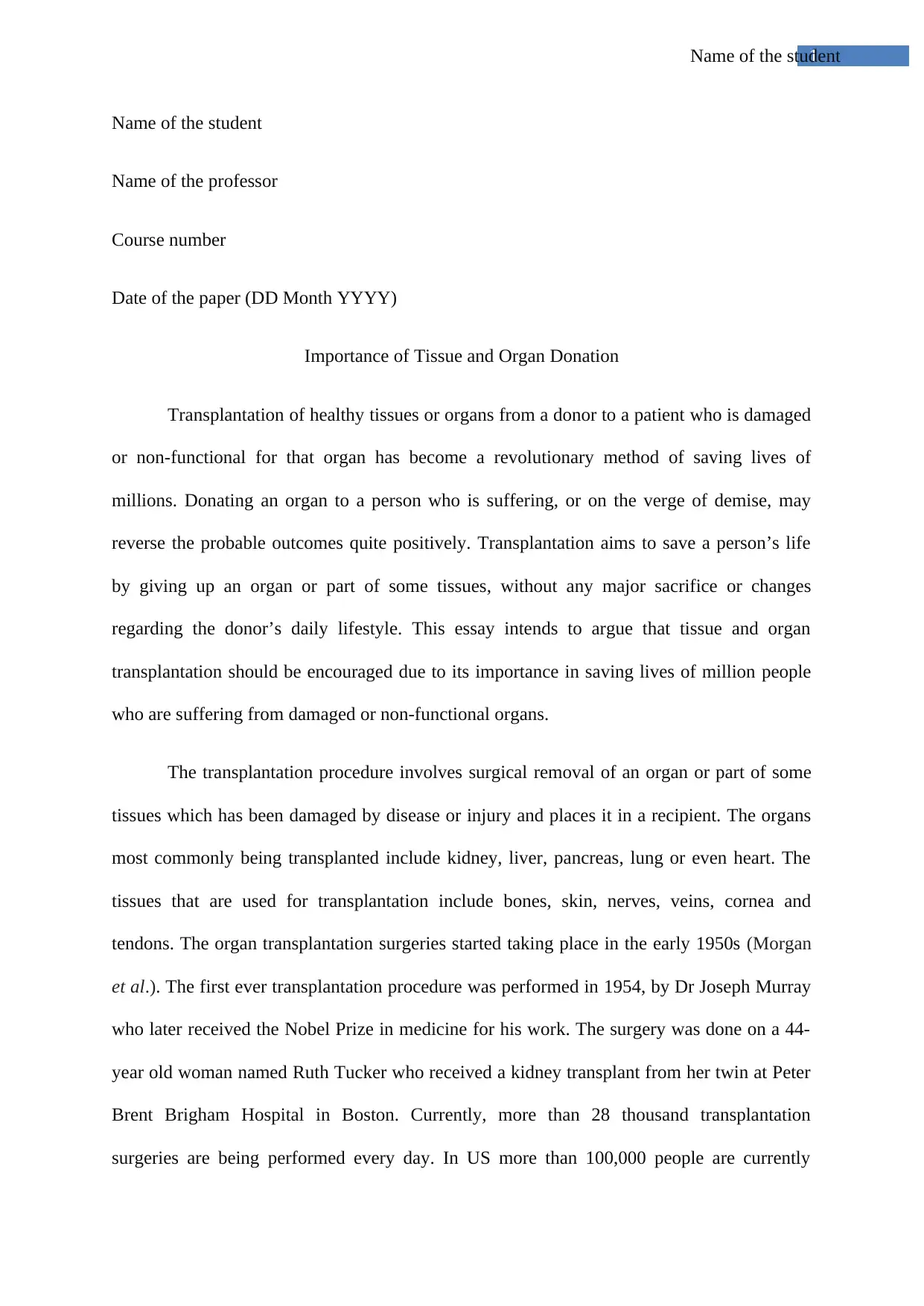
1Name of the student
Name of the student
Name of the professor
Course number
Date of the paper (DD Month YYYY)
Importance of Tissue and Organ Donation
Transplantation of healthy tissues or organs from a donor to a patient who is damaged
or non-functional for that organ has become a revolutionary method of saving lives of
millions. Donating an organ to a person who is suffering, or on the verge of demise, may
reverse the probable outcomes quite positively. Transplantation aims to save a person’s life
by giving up an organ or part of some tissues, without any major sacrifice or changes
regarding the donor’s daily lifestyle. This essay intends to argue that tissue and organ
transplantation should be encouraged due to its importance in saving lives of million people
who are suffering from damaged or non-functional organs.
The transplantation procedure involves surgical removal of an organ or part of some
tissues which has been damaged by disease or injury and places it in a recipient. The organs
most commonly being transplanted include kidney, liver, pancreas, lung or even heart. The
tissues that are used for transplantation include bones, skin, nerves, veins, cornea and
tendons. The organ transplantation surgeries started taking place in the early 1950s (Morgan
et al.). The first ever transplantation procedure was performed in 1954, by Dr Joseph Murray
who later received the Nobel Prize in medicine for his work. The surgery was done on a 44-
year old woman named Ruth Tucker who received a kidney transplant from her twin at Peter
Brent Brigham Hospital in Boston. Currently, more than 28 thousand transplantation
surgeries are being performed every day. In US more than 100,000 people are currently
Name of the student
Name of the professor
Course number
Date of the paper (DD Month YYYY)
Importance of Tissue and Organ Donation
Transplantation of healthy tissues or organs from a donor to a patient who is damaged
or non-functional for that organ has become a revolutionary method of saving lives of
millions. Donating an organ to a person who is suffering, or on the verge of demise, may
reverse the probable outcomes quite positively. Transplantation aims to save a person’s life
by giving up an organ or part of some tissues, without any major sacrifice or changes
regarding the donor’s daily lifestyle. This essay intends to argue that tissue and organ
transplantation should be encouraged due to its importance in saving lives of million people
who are suffering from damaged or non-functional organs.
The transplantation procedure involves surgical removal of an organ or part of some
tissues which has been damaged by disease or injury and places it in a recipient. The organs
most commonly being transplanted include kidney, liver, pancreas, lung or even heart. The
tissues that are used for transplantation include bones, skin, nerves, veins, cornea and
tendons. The organ transplantation surgeries started taking place in the early 1950s (Morgan
et al.). The first ever transplantation procedure was performed in 1954, by Dr Joseph Murray
who later received the Nobel Prize in medicine for his work. The surgery was done on a 44-
year old woman named Ruth Tucker who received a kidney transplant from her twin at Peter
Brent Brigham Hospital in Boston. Currently, more than 28 thousand transplantation
surgeries are being performed every day. In US more than 100,000 people are currently
Paraphrase This Document
Need a fresh take? Get an instant paraphrase of this document with our AI Paraphraser
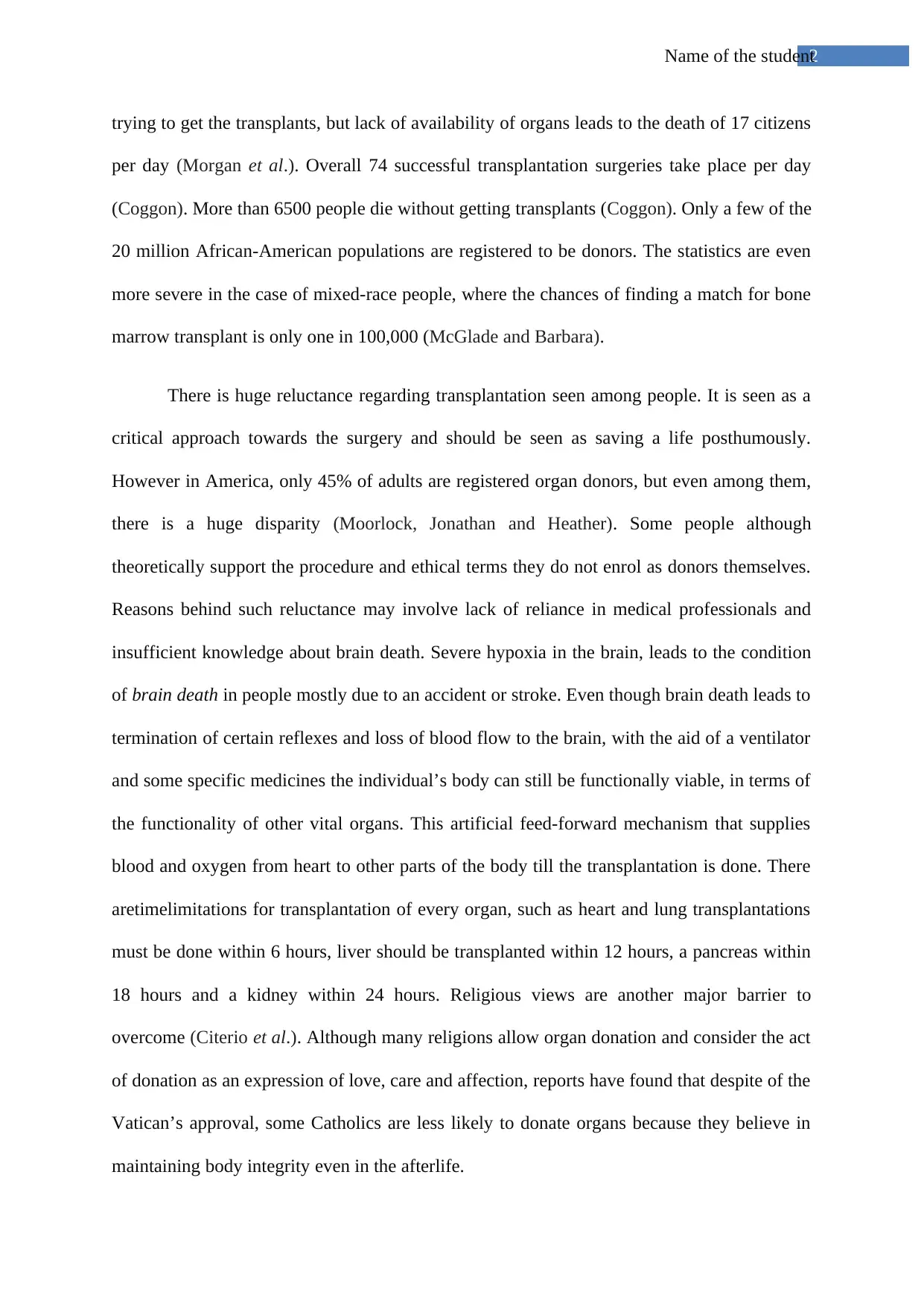
2Name of the student
trying to get the transplants, but lack of availability of organs leads to the death of 17 citizens
per day (Morgan et al.). Overall 74 successful transplantation surgeries take place per day
(Coggon). More than 6500 people die without getting transplants (Coggon). Only a few of the
20 million African-American populations are registered to be donors. The statistics are even
more severe in the case of mixed-race people, where the chances of finding a match for bone
marrow transplant is only one in 100,000 (McGlade and Barbara).
There is huge reluctance regarding transplantation seen among people. It is seen as a
critical approach towards the surgery and should be seen as saving a life posthumously.
However in America, only 45% of adults are registered organ donors, but even among them,
there is a huge disparity (Moorlock, Jonathan and Heather). Some people although
theoretically support the procedure and ethical terms they do not enrol as donors themselves.
Reasons behind such reluctance may involve lack of reliance in medical professionals and
insufficient knowledge about brain death. Severe hypoxia in the brain, leads to the condition
of brain death in people mostly due to an accident or stroke. Even though brain death leads to
termination of certain reflexes and loss of blood flow to the brain, with the aid of a ventilator
and some specific medicines the individual’s body can still be functionally viable, in terms of
the functionality of other vital organs. This artificial feed-forward mechanism that supplies
blood and oxygen from heart to other parts of the body till the transplantation is done. There
aretimelimitations for transplantation of every organ, such as heart and lung transplantations
must be done within 6 hours, liver should be transplanted within 12 hours, a pancreas within
18 hours and a kidney within 24 hours. Religious views are another major barrier to
overcome (Citerio et al.). Although many religions allow organ donation and consider the act
of donation as an expression of love, care and affection, reports have found that despite of the
Vatican’s approval, some Catholics are less likely to donate organs because they believe in
maintaining body integrity even in the afterlife.
trying to get the transplants, but lack of availability of organs leads to the death of 17 citizens
per day (Morgan et al.). Overall 74 successful transplantation surgeries take place per day
(Coggon). More than 6500 people die without getting transplants (Coggon). Only a few of the
20 million African-American populations are registered to be donors. The statistics are even
more severe in the case of mixed-race people, where the chances of finding a match for bone
marrow transplant is only one in 100,000 (McGlade and Barbara).
There is huge reluctance regarding transplantation seen among people. It is seen as a
critical approach towards the surgery and should be seen as saving a life posthumously.
However in America, only 45% of adults are registered organ donors, but even among them,
there is a huge disparity (Moorlock, Jonathan and Heather). Some people although
theoretically support the procedure and ethical terms they do not enrol as donors themselves.
Reasons behind such reluctance may involve lack of reliance in medical professionals and
insufficient knowledge about brain death. Severe hypoxia in the brain, leads to the condition
of brain death in people mostly due to an accident or stroke. Even though brain death leads to
termination of certain reflexes and loss of blood flow to the brain, with the aid of a ventilator
and some specific medicines the individual’s body can still be functionally viable, in terms of
the functionality of other vital organs. This artificial feed-forward mechanism that supplies
blood and oxygen from heart to other parts of the body till the transplantation is done. There
aretimelimitations for transplantation of every organ, such as heart and lung transplantations
must be done within 6 hours, liver should be transplanted within 12 hours, a pancreas within
18 hours and a kidney within 24 hours. Religious views are another major barrier to
overcome (Citerio et al.). Although many religions allow organ donation and consider the act
of donation as an expression of love, care and affection, reports have found that despite of the
Vatican’s approval, some Catholics are less likely to donate organs because they believe in
maintaining body integrity even in the afterlife.
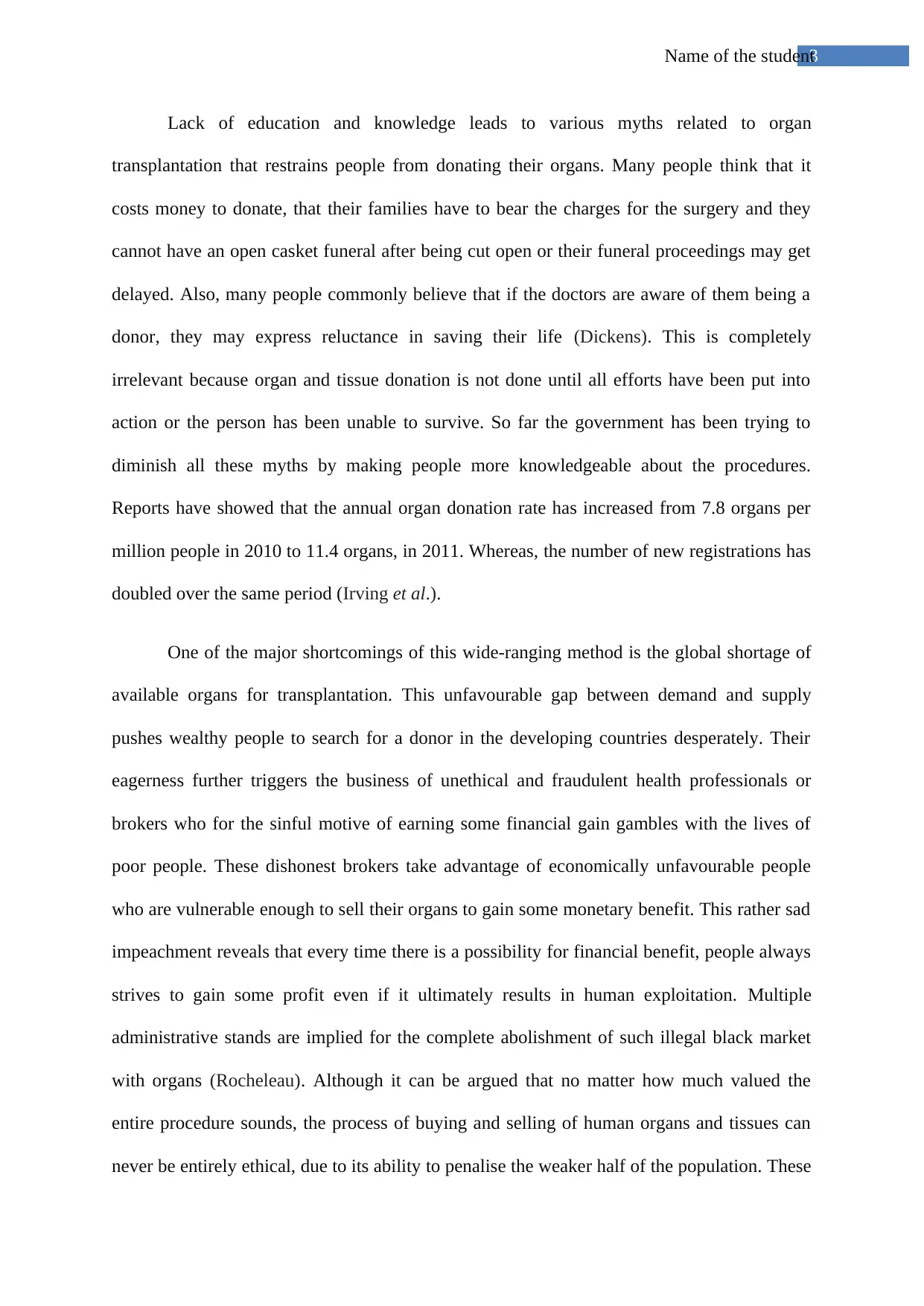
3Name of the student
Lack of education and knowledge leads to various myths related to organ
transplantation that restrains people from donating their organs. Many people think that it
costs money to donate, that their families have to bear the charges for the surgery and they
cannot have an open casket funeral after being cut open or their funeral proceedings may get
delayed. Also, many people commonly believe that if the doctors are aware of them being a
donor, they may express reluctance in saving their life (Dickens). This is completely
irrelevant because organ and tissue donation is not done until all efforts have been put into
action or the person has been unable to survive. So far the government has been trying to
diminish all these myths by making people more knowledgeable about the procedures.
Reports have showed that the annual organ donation rate has increased from 7.8 organs per
million people in 2010 to 11.4 organs, in 2011. Whereas, the number of new registrations has
doubled over the same period (Irving et al.).
One of the major shortcomings of this wide-ranging method is the global shortage of
available organs for transplantation. This unfavourable gap between demand and supply
pushes wealthy people to search for a donor in the developing countries desperately. Their
eagerness further triggers the business of unethical and fraudulent health professionals or
brokers who for the sinful motive of earning some financial gain gambles with the lives of
poor people. These dishonest brokers take advantage of economically unfavourable people
who are vulnerable enough to sell their organs to gain some monetary benefit. This rather sad
impeachment reveals that every time there is a possibility for financial benefit, people always
strives to gain some profit even if it ultimately results in human exploitation. Multiple
administrative stands are implied for the complete abolishment of such illegal black market
with organs (Rocheleau). Although it can be argued that no matter how much valued the
entire procedure sounds, the process of buying and selling of human organs and tissues can
never be entirely ethical, due to its ability to penalise the weaker half of the population. These
Lack of education and knowledge leads to various myths related to organ
transplantation that restrains people from donating their organs. Many people think that it
costs money to donate, that their families have to bear the charges for the surgery and they
cannot have an open casket funeral after being cut open or their funeral proceedings may get
delayed. Also, many people commonly believe that if the doctors are aware of them being a
donor, they may express reluctance in saving their life (Dickens). This is completely
irrelevant because organ and tissue donation is not done until all efforts have been put into
action or the person has been unable to survive. So far the government has been trying to
diminish all these myths by making people more knowledgeable about the procedures.
Reports have showed that the annual organ donation rate has increased from 7.8 organs per
million people in 2010 to 11.4 organs, in 2011. Whereas, the number of new registrations has
doubled over the same period (Irving et al.).
One of the major shortcomings of this wide-ranging method is the global shortage of
available organs for transplantation. This unfavourable gap between demand and supply
pushes wealthy people to search for a donor in the developing countries desperately. Their
eagerness further triggers the business of unethical and fraudulent health professionals or
brokers who for the sinful motive of earning some financial gain gambles with the lives of
poor people. These dishonest brokers take advantage of economically unfavourable people
who are vulnerable enough to sell their organs to gain some monetary benefit. This rather sad
impeachment reveals that every time there is a possibility for financial benefit, people always
strives to gain some profit even if it ultimately results in human exploitation. Multiple
administrative stands are implied for the complete abolishment of such illegal black market
with organs (Rocheleau). Although it can be argued that no matter how much valued the
entire procedure sounds, the process of buying and selling of human organs and tissues can
never be entirely ethical, due to its ability to penalise the weaker half of the population. These
⊘ This is a preview!⊘
Do you want full access?
Subscribe today to unlock all pages.

Trusted by 1+ million students worldwide
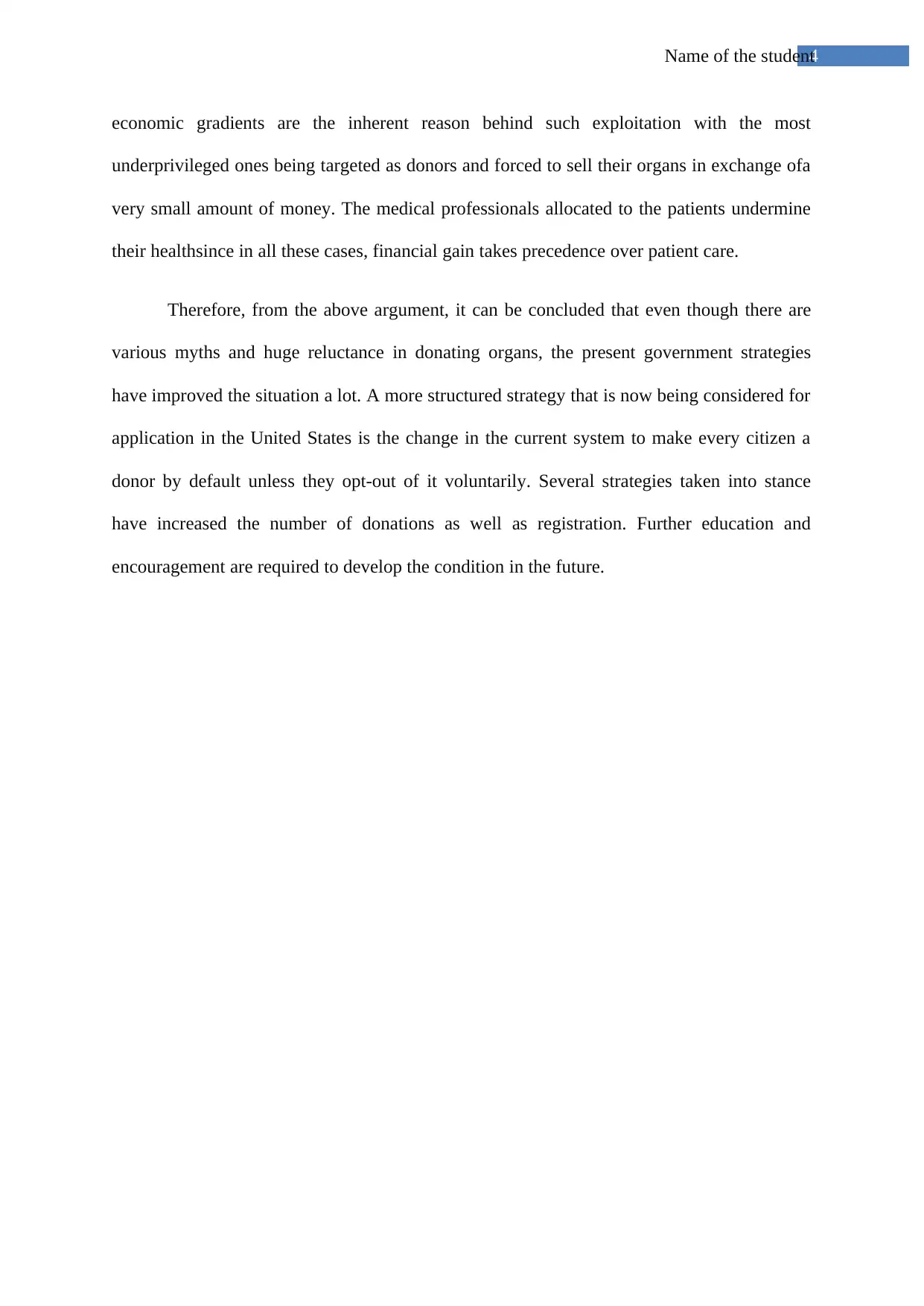
4Name of the student
economic gradients are the inherent reason behind such exploitation with the most
underprivileged ones being targeted as donors and forced to sell their organs in exchange ofa
very small amount of money. The medical professionals allocated to the patients undermine
their healthsince in all these cases, financial gain takes precedence over patient care.
Therefore, from the above argument, it can be concluded that even though there are
various myths and huge reluctance in donating organs, the present government strategies
have improved the situation a lot. A more structured strategy that is now being considered for
application in the United States is the change in the current system to make every citizen a
donor by default unless they opt-out of it voluntarily. Several strategies taken into stance
have increased the number of donations as well as registration. Further education and
encouragement are required to develop the condition in the future.
economic gradients are the inherent reason behind such exploitation with the most
underprivileged ones being targeted as donors and forced to sell their organs in exchange ofa
very small amount of money. The medical professionals allocated to the patients undermine
their healthsince in all these cases, financial gain takes precedence over patient care.
Therefore, from the above argument, it can be concluded that even though there are
various myths and huge reluctance in donating organs, the present government strategies
have improved the situation a lot. A more structured strategy that is now being considered for
application in the United States is the change in the current system to make every citizen a
donor by default unless they opt-out of it voluntarily. Several strategies taken into stance
have increased the number of donations as well as registration. Further education and
encouragement are required to develop the condition in the future.
Paraphrase This Document
Need a fresh take? Get an instant paraphrase of this document with our AI Paraphraser
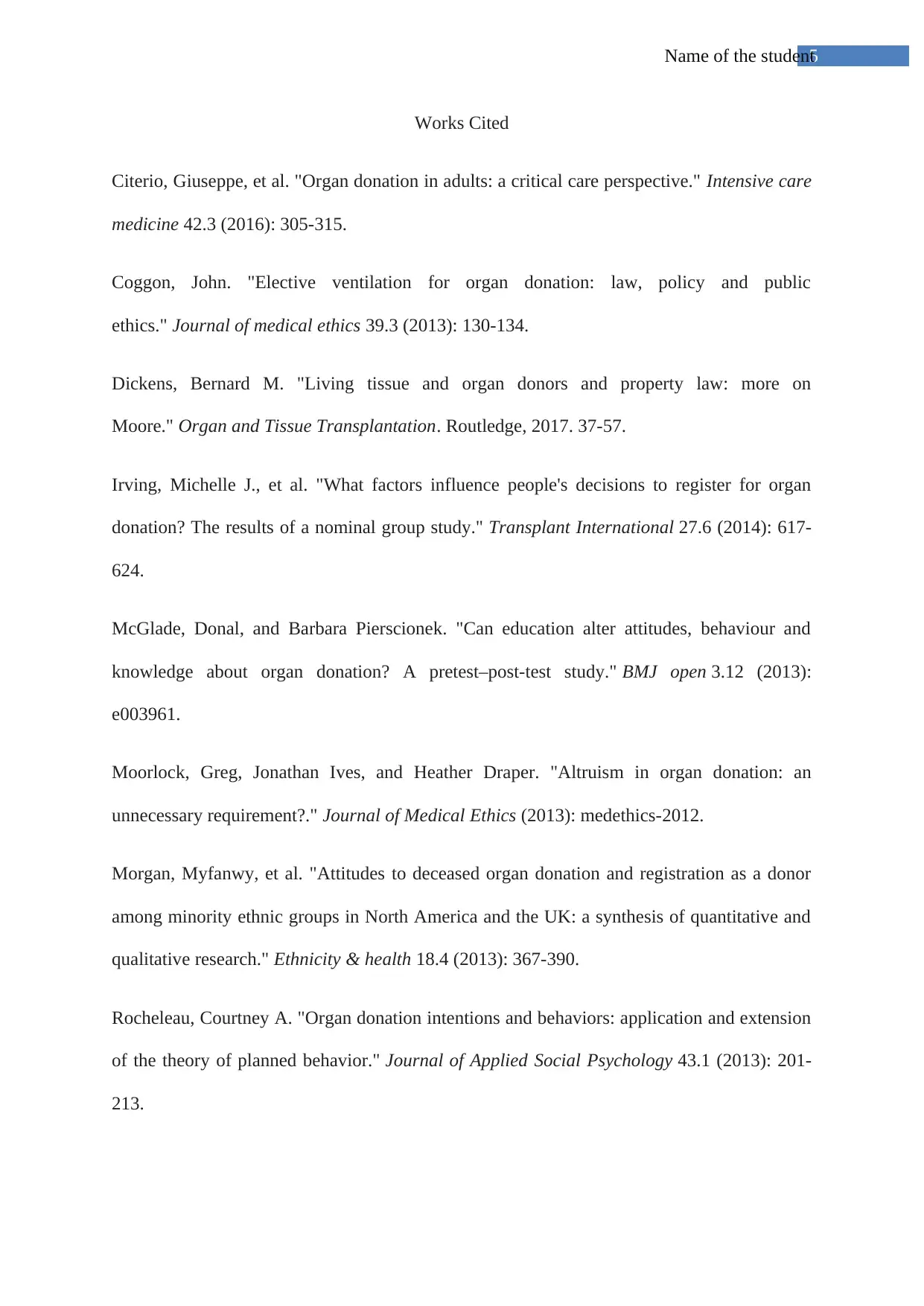
5Name of the student
Works Cited
Citerio, Giuseppe, et al. "Organ donation in adults: a critical care perspective." Intensive care
medicine 42.3 (2016): 305-315.
Coggon, John. "Elective ventilation for organ donation: law, policy and public
ethics." Journal of medical ethics 39.3 (2013): 130-134.
Dickens, Bernard M. "Living tissue and organ donors and property law: more on
Moore." Organ and Tissue Transplantation. Routledge, 2017. 37-57.
Irving, Michelle J., et al. "What factors influence people's decisions to register for organ
donation? The results of a nominal group study." Transplant International 27.6 (2014): 617-
624.
McGlade, Donal, and Barbara Pierscionek. "Can education alter attitudes, behaviour and
knowledge about organ donation? A pretest–post-test study." BMJ open 3.12 (2013):
e003961.
Moorlock, Greg, Jonathan Ives, and Heather Draper. "Altruism in organ donation: an
unnecessary requirement?." Journal of Medical Ethics (2013): medethics-2012.
Morgan, Myfanwy, et al. "Attitudes to deceased organ donation and registration as a donor
among minority ethnic groups in North America and the UK: a synthesis of quantitative and
qualitative research." Ethnicity & health 18.4 (2013): 367-390.
Rocheleau, Courtney A. "Organ donation intentions and behaviors: application and extension
of the theory of planned behavior." Journal of Applied Social Psychology 43.1 (2013): 201-
213.
Works Cited
Citerio, Giuseppe, et al. "Organ donation in adults: a critical care perspective." Intensive care
medicine 42.3 (2016): 305-315.
Coggon, John. "Elective ventilation for organ donation: law, policy and public
ethics." Journal of medical ethics 39.3 (2013): 130-134.
Dickens, Bernard M. "Living tissue and organ donors and property law: more on
Moore." Organ and Tissue Transplantation. Routledge, 2017. 37-57.
Irving, Michelle J., et al. "What factors influence people's decisions to register for organ
donation? The results of a nominal group study." Transplant International 27.6 (2014): 617-
624.
McGlade, Donal, and Barbara Pierscionek. "Can education alter attitudes, behaviour and
knowledge about organ donation? A pretest–post-test study." BMJ open 3.12 (2013):
e003961.
Moorlock, Greg, Jonathan Ives, and Heather Draper. "Altruism in organ donation: an
unnecessary requirement?." Journal of Medical Ethics (2013): medethics-2012.
Morgan, Myfanwy, et al. "Attitudes to deceased organ donation and registration as a donor
among minority ethnic groups in North America and the UK: a synthesis of quantitative and
qualitative research." Ethnicity & health 18.4 (2013): 367-390.
Rocheleau, Courtney A. "Organ donation intentions and behaviors: application and extension
of the theory of planned behavior." Journal of Applied Social Psychology 43.1 (2013): 201-
213.
1 out of 5
Related Documents
Your All-in-One AI-Powered Toolkit for Academic Success.
+13062052269
info@desklib.com
Available 24*7 on WhatsApp / Email
![[object Object]](/_next/static/media/star-bottom.7253800d.svg)
Unlock your academic potential
Copyright © 2020–2025 A2Z Services. All Rights Reserved. Developed and managed by ZUCOL.




